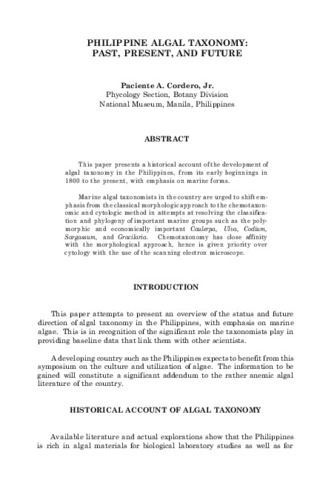Philippine algal taxonomy: Past, present, and future
Share
Abstract
This paper presents a historical account of the development of algal taxonomy in the Philippines, from its early beginnings in 1800 to the present, with emphasis on marine forms.
Marine algal taxonomists in the country are urged to shift emphasis from the classical morphologic approach to the chemotaxonomic and cytologic method in attempts at resolving the classification and phylogeny of important marine groups such as the polymorphic and economically important Caulerpa, Ulva, Codium, Sargassum , and Gracilaria . Chemotaxonomy has close affinity with the morphological approach, hence is given priority over cytology with the use of the scanning electron microscope.
Suggested Citation
Cordero Jr., P. A. (1990). Philippine algal taxonomy: Past, present, and future. In I. J. Dogma Jr., G. C. Trono Jr., & R. A. Tabbada (Eds.), Culture and use of algae in Southeast Asia: Proceedings of the Symposium on Culture and Utilization of Algae in Southeast Asia, 8-11 December 1981, Tigbauan, Iloilo, Philippines. (pp. 89-97). Tigbauan, Iloilo, Philippines: Aquaculture Department, Southeast Asian Fisheries Development Center.


